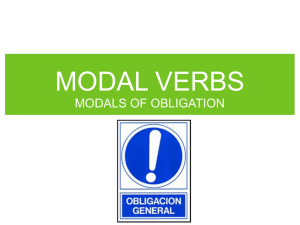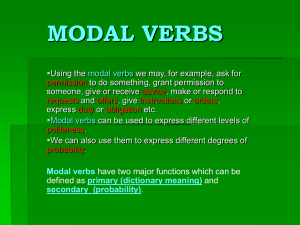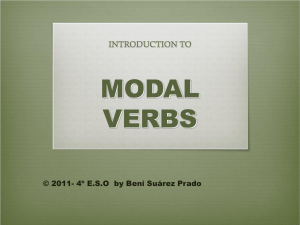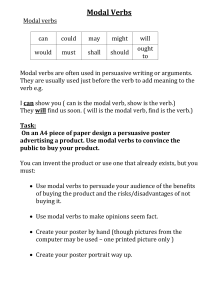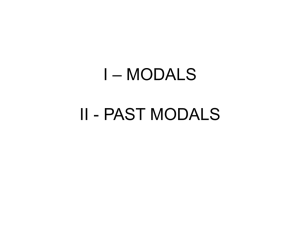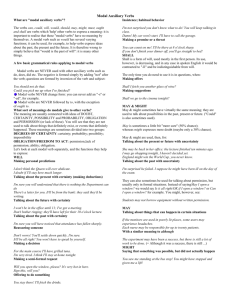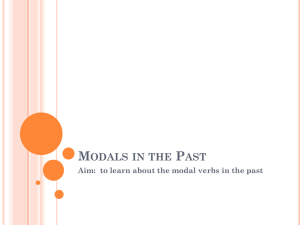Modal verbs and their meaning
advertisement
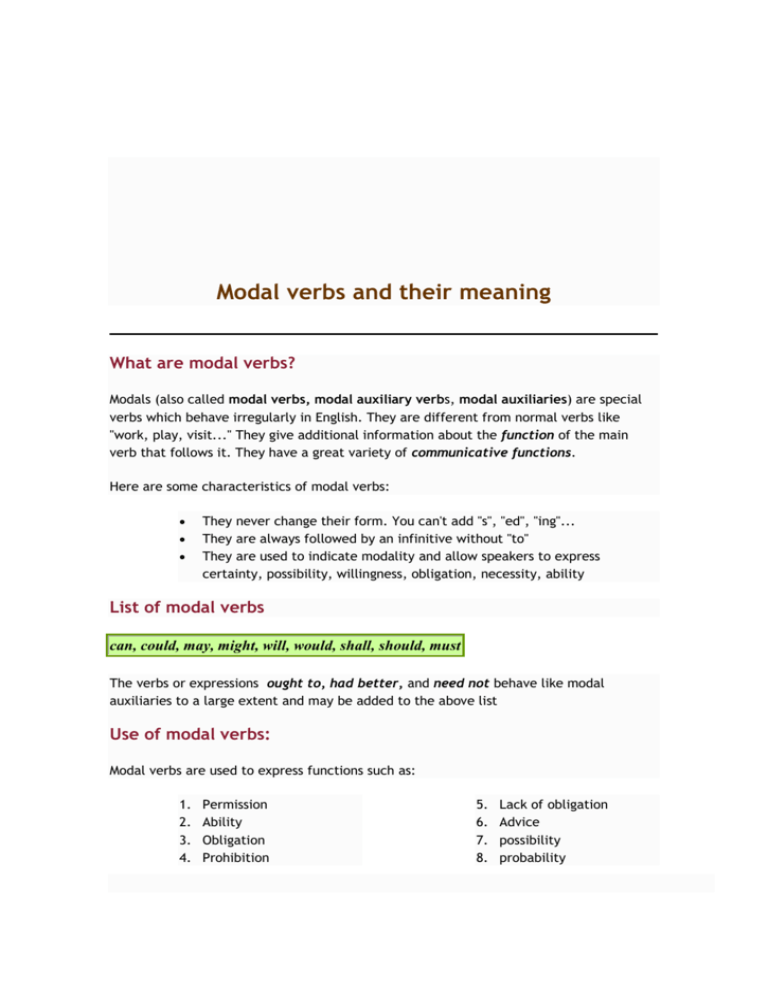
Modal verbs and their meaning What are modal verbs? Modals (also called modal verbs, modal auxiliary verbs, modal auxiliaries) are special verbs which behave irregularly in English. They are different from normal verbs like "work, play, visit..." They give additional information about the function of the main verb that follows it. They have a great variety of communicative functions. Here are some characteristics of modal verbs: They never change their form. You can't add "s", "ed", "ing"... They are always followed by an infinitive without "to" They are used to indicate modality and allow speakers to express certainty, possibility, willingness, obligation, necessity, ability List of modal verbs can, could, may, might, will, would, shall, should, must The verbs or expressions ought to, had better, and need not behave like modal auxiliaries to a large extent and may be added to the above list Use of modal verbs: Modal verbs are used to express functions such as: 1. 2. 3. 4. Permission Ability Obligation Prohibition 5. 6. 7. 8. Lack of obligation Advice possibility probability Examples of modal verbs Here is a list of modals with examples: Modal Verb must must not can could may might need not should/ought to had better Expressing Example Strong obligation You must stop when the traffic lights turn red. logical conclusion / Certainty He must be very tired. He's been working all day long. prohibition You must not smoke in the hospital. ability I can swim. permission Can I use your phone please? possibility Smoking can cause cancer. ability in the past When I was younger I could run fast. polite permission Excuse me, could I just say something? possibility It could rain tomorrow! permission May I use your phone please? possibility, probability It may rain tomorrow! polite permission Might I suggest an idea? possibility, probability I might go on holiday to Australia next year. lack of necessity/absence of obligation I need not buy tomatoes. There are plenty of tomatoes in the fridge. 50 % obligation I should / ought to see a doctor. I have a terrible headache. advice You should / ought to revise your lessons logical conclusion He should / ought to be very tired. He's been working all day long. advice You 'd better revise your lessons Remember Modal verbs are followed by an infinitive without "to", also called the bare infinitive. Examples: You must stop when the traffic lights turn red. You should see a doctor. There are a lot of tomatoes in the fridge. You need not buy Modals in the present and past Generally speaking modals in the past have the following form: modal + have + past participle Example: Present: You should see a doctor. Past: You should have seen a doctor Except for modals that express obligation, ability and lack of necessity/obligation: Obligation: Present = I must / have to work hard. -- Past = I had to work hard. Ability: Present = I can run fast. -- Past = I could run fast when I was young. Lack of necessity: Present = You don't have to / needn't take your umbrella. -- Past = You didn't have to / didn't need to take your umbrella. Modals in the Present Obligation You must / have to stop when the traffic lights are Modals in the Past You had to stop. red. Advice You should see a doctor. You should have seen a doctor Prohibition You mustn't smoke here. You mustn't have smoked there. Ability I can run fast. I could run fast. now I am old. Certainty He has a Rolls Royce. He must be very rich. He must have been rich. He had a big He can't be American. His English is terrible. house and an expensive car. He can't have written that poem. He was illiterate. Permission Can I go out? She could drive her father's car when she was only 15. Possibility It may / can / could / might rain. It's cloudy. I guess it may / can / could / might have been Lacy on the phone. Lack of You don't have to / needn't buy any tomatoes. You didn't have to / didn't need to necessity There are plenty in the fridge. buy tomatoes. What's the difference between must and have to? Must and have to are modal verbs in English. This page will guide you to the proper use of these modals. Must 1. We use must to make a logical deduction based on evidence. It indicates that the speaker is certain about something: Examples: It has rained all day, it must be very wet outside. The weather is fantastic in California. It must be a lot fun to live there. 2. Must is also used to express a strong obligation. Examples: Students must arrive in class on time. I must go to bed. Have to Like must, have to is used to express strong obligation, but when we use have to there is usually a sense of external obligation. Some external circumstance makes the obligation necessary. Examples: I have to send an urgent email. I have to take this book back to the library. REMEMBER: when we cannot use CAN, we use BE ABLE TO; when we cannot use MUST, we use HAVE TO Practice on Modals 1. Modal verbs have various functions, some essential ones of which are listed below. Reading the sample sentences, classify the underlined modals according to their functions: possibility: certainty: deduction: obligation: permission: necessity: lack of obligation: advice: expectation: preference: requests: offers & invitations: habitual past actions: ability: typical behaviour: 1. You should bring some warm clothing. It may snow while we're up there. 2. You had better not turn down his proposal. 3. Harry would do a thing like that! I've known him for years. 4. He would sometimes get out of control, don't you remember? 5. Ben has studied enough, so he should pass the advanced driving test tomorrow. 6. Could you tell me the time? 7. I would rather lick an ashtray than kiss a smoker. 8. You mustn't forget to post the letters or the boss will surely go crazy. 9. I needn't get the drinks ready because we might not have the party tomorrow. 10. No one but Tom was able to swim across the lake. 11. What's that noise? Could it be a cat on the roof? 12. At one time people used to walk long distances on foot but now we need to take a taxi or something when we have to travel even the shortest distances. 13. My brother could play the violin with expert skill when he was a child. 14. Will you please try not to raise your voice? The baby is asleep. 15. She must be out of the town at the moment. No one has seen her nowadays. 16. Would you like to spend the night in my flat? 17. You must watch every step of yours while crossing a mine field. 18. We don't need to be told what's to be done. 2. Put in ‘can’ / ‘can’t’ / ‘could’ / ‘couldn’t’. If none is possible, use ‘be able to’ in the correct tense: 1. _________________ you swim when you were 10? 2. We _________________ get to the meeting on time yesterday because the train was delayed by one hour. 3. He _________________ arrive at the party on time, even after missing the train, so he was very pleased. 4. He’s amazing, he _________________ speak 5 languages including Chinese. 5. I _________________ drive a car until I was 34, then I moved to the countryside so I had to learn. 6. I looked everywhere for my glasses but I _________________ find them anywhere. 7. I searched for your house for ages, luckily I _________________ find it in the end. 8. She’s 7 years old but she _________________ read yet – her parents are getting her extra lessons. 9. I read the book three times but I _________________ understand it. 10. James _________________ speak Japanese when he lived in Japan, but he’s forgotten most of it now. 3. Put in “mustn’t” or ‘don’t / doesn’t have to’: 1. We have a lot of work tomorrow. You _______________ be late. 2. You _______________ tell anyone what I just told you. It’s a secret. 3. The museum is free. You _______________ pay to get in. 4. Children _______________ tell lies. It’s very naughty. 5. John’s a millionaire. He _______________ go to work. 6. I _______________ do my washing, because my mother does it for me. 7. We _______________ rush. We’ve got plenty of time. 8. You _______________ smoke inside the school. 9. You can borrow my new dress but you _______________ get it dirty. 10. We _______________ miss the train, it’s the last one tonight. 4. Put in ‘must + infinitive’ or ‘must + have + past participle’: 1. Keiko always does really well on exams. She _____________ (study) a lot. 2. That woman drives a very expensive car. She _____________ (have) a lot of money. 3. You _____________ (practise) a lot before you gave your speech. It was really great. 4. When Lizzie got home yesterday, there were flowers on the table. Her husband _____________ (buy) them. 5. Where is my purse? I saw it earlier, so it _____________ (be) in this room. 6. Sarah couldn’t find her glasses. She thought she _____________ (leave) them at her office. 7. It _____________ (be) cold outside. That man in the street is wearing a coat. 8. All my plants _____________ (be) dead! I forgot to water them before I left for my holiday. 9. Susie is so late! She _____________ (miss) the train. 10. There’s rubbish all over my garden! A fox _____________ (be) in the bin. 5. Put in ‘can’t’ or ‘must’: 1. Why is that man looking around like that? He _____________ be lost. 2. That woman _____________ be a doctor! She looks far too young. 3. John always fails the tests, even though he’s clever. He _____________ study enough. 4. The food is really good at that restaurant. They _____________ have a great chef. 5. Who’s that at the door? It _____________ be Susie – she’ll still be at work now. 6. This _____________ be John’s house. This house has a red door, and it’s number 24, just like he said. 7. Julie _____________ have much money, or she would buy a new car. Her old one is falling apart. 8. He _____________ be at work now, can he? It’s nearly midnight. 9. What a lot of lovely flowers you have! You _____________ really like gardening. 10. David _____________ drink a lot of coffee. He’s finished two packets already this week! 6. Re-write the sentences so that they have the same meaning as the original. You must use a modal verb: 1. I'm sure John locked the office before leaving. He always does 2. If I were you I would tell him the truth. 3. It isn't necessary for her to phone me back 4. Ann finished the project on her own although it wasn't necessary to do so. 5. It was a mistake to sell the house. I wish I hadn't. 6. Perhaps we'll go swimming tomorrow 7. I think Mary is probably at home because the windows are open. 8. Perhaps John knew about the trip, but I'm not sure. 9. Perhaps she was at work when the earthquake struck. 10. It's absolutely necessary that we finish the article today. 11. It wasn't necessary for him to behave like that. 12. It's quite possible that they went away last weekend 13. I'm sure Ann didn't send that letter. 14. It was a mistake not to accept his offer. I wish I had. 15. It is essential that we talk before the meeting starts. 16. I don't think Ann robbed the money. It's impossible. 17. Why don't we go on a camping trip?



